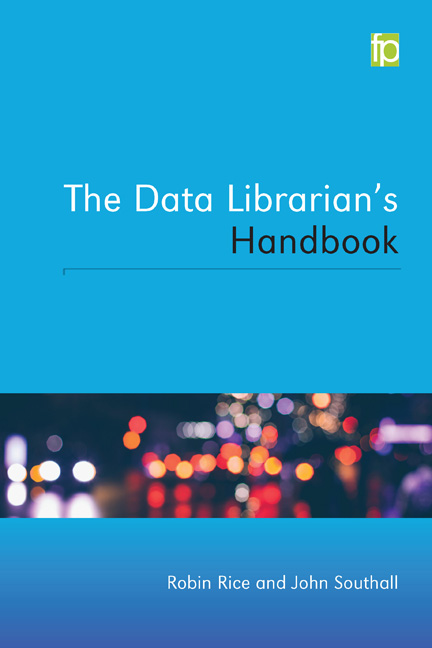Book contents
- Frontmatter
- Contents
- Acknowledgements
- Preface
- 1 Data librarianship: responding to research innovation
- 2 What is different about data?
- 3 Supporting data literacy
- 4 Building a data collection
- 5 Research data management service and policy: working across your institution
- 6 Data management plans as a calling card
- 7 Essentials of data repositories
- 8 Dealing with sensitive data
- 9 Data sharing in the disciplines
- 10 Supporting open scholarship and open science
- References
- Index
8 - Dealing with sensitive data
Published online by Cambridge University Press: 08 June 2018
- Frontmatter
- Contents
- Acknowledgements
- Preface
- 1 Data librarianship: responding to research innovation
- 2 What is different about data?
- 3 Supporting data literacy
- 4 Building a data collection
- 5 Research data management service and policy: working across your institution
- 6 Data management plans as a calling card
- 7 Essentials of data repositories
- 8 Dealing with sensitive data
- 9 Data sharing in the disciplines
- 10 Supporting open scholarship and open science
- References
- Index
Summary
Challenging assumptions about data
What is meant by confidential or sensitive data? In Chapter 2 we outlined some of the formats of common types of research data. The field is of course wide and may include datasets that are based on numbers, text or audiovisual material. Most of the time researchers will be interested in how they can manipulate these in order to address the goals of their investigations. Some researchers are interested less in the format than in what they consider to be fundamental problems of confidentiality or data sensitivity. They have concerns about managing the data securely while they are working with it – and are unsure what they are supposed to do. Others have concerns about the appropriateness of allowing preservation or re-use of the same material. Understanding what a researcher actually means when they state their data are confidential therefore becomes significant. This is a growing area of discussion and is demonstrated by the huge interest shown by researchers in training and awareness raising courses on this topic. Typical concerns include whether the data:
1 were collected just for a specific research project
2 are still needed for future analysis
3 may only be properly understood by the original researchers
4 should be destroyed once they have been used or analysed
5 could be exploited for non-academic purposes
6 cover a subject area that is not for public consumption such as studies of terrorists, family history or locations of endangered species
7 contain general information that could allow participants to be Identified
8 include names and addresses or similar personal information
9 include particular details that could be harmful to participants if made Public
10 are to be treated as confidential so an unintended release in itself would be damaging.
Such a wide range of concerns illustrates that no data type is inherently more confidential than another. It is possible to encounter variations on some or all of these arguments from researchers working with statistical data, video interviews or samples of genetic material. However it is commonplace to find researchers working under the assumption that all their data are confidential and present unique problems. The role of the data librarian is to help shift that perception.
- Type
- Chapter
- Information
- The Data Librarian's Handbook , pp. 121 - 136Publisher: FacetPrint publication year: 2016



